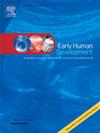The influence of physical, psychological and sociocultural factors on cognitive performance: A nationwide cross-sectional analysis in 10–12-year-old Danish children
IF 2.2
3区 医学
Q2 OBSTETRICS & GYNECOLOGY
引用次数: 0
Abstract
Objective
To assess the associations between exercise capacity, body composition, demographic characteristics, well-being dimensions, and leisure-time sports background with cognitive performance in children aged 10–12 years.
Methods
A cross-sectional study was conducted with 2470 Danish schoolchildren aged 10–12. Cognitive performance was assessed using the Cogstate Brief Battery, measuring psychomotor function, attention, working memory, and visual learning. Exercise capacity was evaluated using the Yo-Yo Intermittent Recovery Level 1 Children's Test (YYIR1C). Body composition, including BMI, fat percentage, and muscle mass percentage, was assessed with bioelectrical impedance analysis. Well-being was measured using a modified KIDSCREEN-27 questionnaire, and demographic characteristics and leisure-time sports background data were collected via self-reports. Linear mixed regression models were applied, adjusting for school-class as a random effect.
Results
Higher exercise capacity was significantly associated with better cognitive performance across all domains (p < 0.05). Boys exhibited faster reaction times in psychomotor function, attention, and working memory tasks (p < 0.001), while no sex differences were observed in visual learning (p = 0.684). School well-being positively correlated with attention and working memory performance, but no associations were found with other well-being dimensions. Body composition (BMI, fat percentage, muscle mass) and leisure-time sports background were not associated with cognitive performance.
Conclusions
Exercise capacity, but not body composition or sports participation, emerged as a key predictor of cognitive performance. These findings suggest that cardiorespiratory fitness, rather than body composition or sports background, is a general predictor of cognitive performance in children. School well-being and sex also influenced cognitive test performance, highlighting the importance of considering both physical and psychological factors.
生理、心理和社会文化因素对认知表现的影响:对10 - 12岁丹麦儿童的全国性横断面分析
目的探讨10-12岁儿童的运动能力、身体组成、人口统计学特征、幸福感维度和休闲运动背景与认知能力的关系。方法对2470名10 ~ 12岁丹麦学龄儿童进行横断面研究。使用认知状态简短电池评估认知表现,测量精神运动功能、注意力、工作记忆和视觉学习。使用溜溜球间歇恢复1级儿童测试(YYIR1C)评估运动能力。用生物电阻抗分析评估身体组成,包括BMI、脂肪百分比和肌肉质量百分比。幸福感采用改良的KIDSCREEN-27问卷进行测量,并通过自我报告收集人口统计学特征和休闲时间运动背景数据。采用线性混合回归模型,将学校班级作为随机效应进行调整。结果较高的运动能力与各领域较好的认知表现显著相关(p <;0.05)。男孩在精神运动功能、注意力和工作记忆任务中表现出更快的反应时间(p <;0.001),而在视觉学习方面无性别差异(p = 0.684)。学校幸福感与注意力和工作记忆表现呈正相关,而与其他幸福感维度无显著相关。身体成分(BMI,脂肪百分比,肌肉质量)和业余运动背景与认知表现无关。结论运动能力,而不是身体成分或运动参与,是认知表现的关键预测因素。这些发现表明,心肺健康,而不是身体成分或运动背景,是儿童认知能力的一般预测因素。学校福利和性也会影响认知测试的表现,这突出了考虑生理和心理因素的重要性。
本文章由计算机程序翻译,如有差异,请以英文原文为准。
求助全文
约1分钟内获得全文
求助全文
来源期刊

Early human development
医学-妇产科学
CiteScore
4.40
自引率
4.00%
发文量
100
审稿时长
46 days
期刊介绍:
Established as an authoritative, highly cited voice on early human development, Early Human Development provides a unique opportunity for researchers and clinicians to bridge the communication gap between disciplines. Creating a forum for the productive exchange of ideas concerning early human growth and development, the journal publishes original research and clinical papers with particular emphasis on the continuum between fetal life and the perinatal period; aspects of postnatal growth influenced by early events; and the safeguarding of the quality of human survival.
The first comprehensive and interdisciplinary journal in this area of growing importance, Early Human Development offers pertinent contributions to the following subject areas:
Fetology; perinatology; pediatrics; growth and development; obstetrics; reproduction and fertility; epidemiology; behavioural sciences; nutrition and metabolism; teratology; neurology; brain biology; developmental psychology and screening.
 求助内容:
求助内容: 应助结果提醒方式:
应助结果提醒方式:


